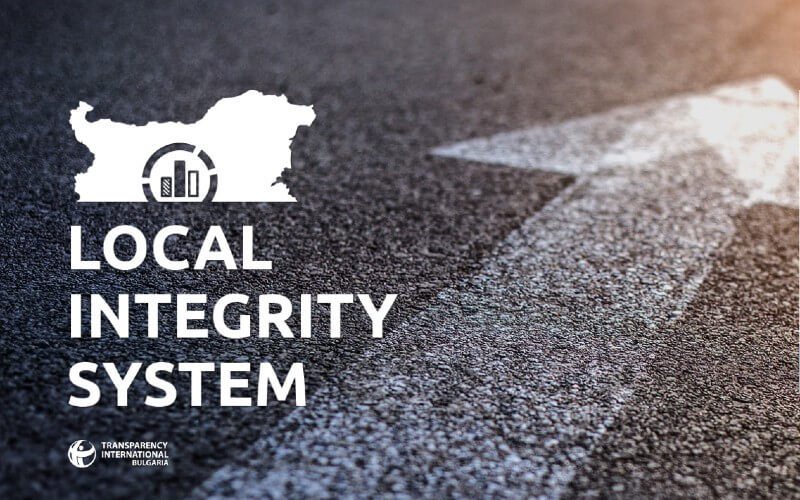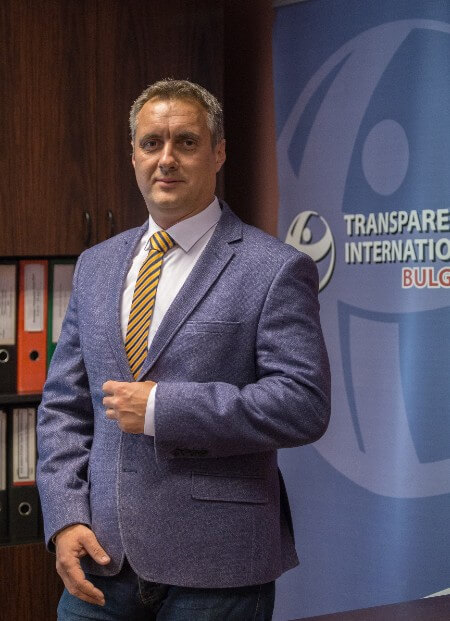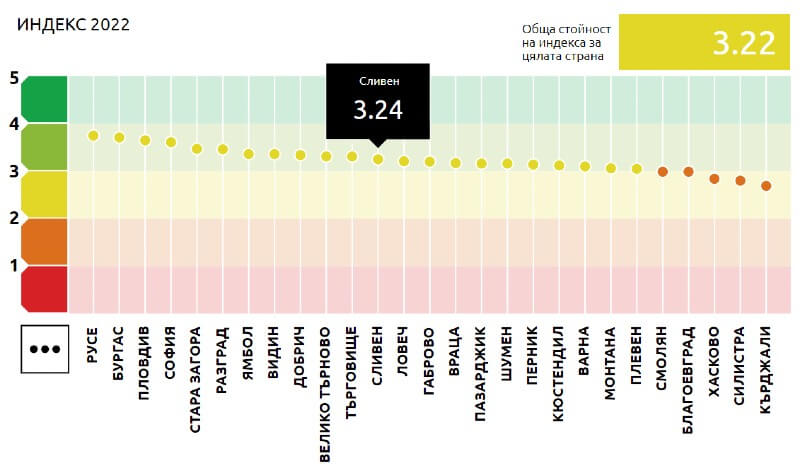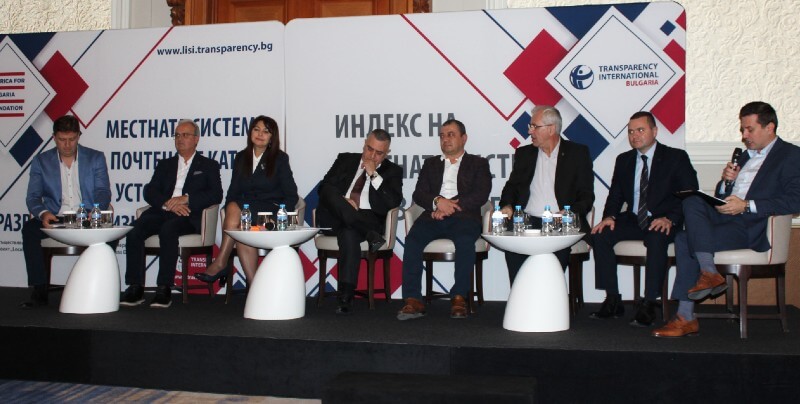 One effective way to encourage Bulgarian cities to improve the services they provide to citizens and businesses is to communicate their successes and failures publicly. Transparency International – Bulgaria’s Local Integrity System Index is a tool that does just that. By evaluating the work of local institutions and enabling comparisons across cities, the annual index promotes positive competition between city administrations and has helped to introduce anti-corruption measures and enhance institutional accountability at the local level.
One effective way to encourage Bulgarian cities to improve the services they provide to citizens and businesses is to communicate their successes and failures publicly. Transparency International – Bulgaria’s Local Integrity System Index is a tool that does just that. By evaluating the work of local institutions and enabling comparisons across cities, the annual index promotes positive competition between city administrations and has helped to introduce anti-corruption measures and enhance institutional accountability at the local level.
On December 8, Transparency International – Bulgaria released the Local Integrity System Index for 2022. Despite a general dip in performance nationwide since the release of the last annual index five years ago, the organization also recognized good practices and local actors who advanced the cause of transparency over the past few years.
We talked to Kalin Slavov, the corruption watchdog’s executive director, about the major trends in local government and the work that still needs to be done on the path toward public sector integrity and accountability.
America for Bulgaria Foundation: What is the Local Integrity System Index, and what challenges does it address?
Kalin Slavov: We started out identifying what we needed and then began looking for an instrument that would come closest to providing solutions to topical questions related to local self-government, local administration, and the anti-corruption environment at the local level. We started from the assumption that we can be useful both to citizens — because ultimately the goal is to improve local government services for them — and to business. Businesses make investment decisions, and investments are never at the national level; they are in the municipality of Veliko Tarnovo, Varna, Sofia, etc. It is very important for business to know what it will encounter in terms of local administration, specifically whether local institutions adhere to good business practices, such as issuing construction and food sale permits on time, providing access to electricity and water, etc. If you build a new warehouse, factory, or a similar facility, you need to know whether you will have a road to it and whether your workers will be able to get to it. These are things that every business is interested in. The overall atmosphere in which they happen is very important, and our index provides some indication of the general direction in which a place is going.

We look at multiple local actors, not only at local administrations, but also at national institutions that have local structures, such as the police and the courts. We consider the work of political parties at the local level and attitudes to the nongovernmental sector because NGOs shape the local environment to a great extent. It is important whether demographic trends are positive or negative. Above all, we consider migration flows and whether there is a good environment that can meet workers’ informal, cultural needs, whether their children can attend courses assisting in their development, etc. These are some of the decisions you make in determining whether or not to stay in town. If these elements are missing and need to be compensated for, businesses must anticipate those gaps and work in that direction.
After we saw what type of challenges we wanted to address, we turned to our network. The strength of Transparency International as a movement is that we work in countries with every imaginable type of socioeconomic structure and at every stage of societal development, so suitable models are always available. In this case, we looked for a model that was close enough to Bulgarian reality, and then we adapted some of the indicators. What’s different about our approach is that we decided to focus on the positive elements. We felt that pointing a finger at someone was not that productive.
The methodology involves monitoring local authorities and developing a ranking, with the Bulgarian index being adapted to the role of each local institution.
ABF: How do you collect the information that goes into the index?
K.S.: We have an analytical part: we analyze which institution does what. Then, we collect information through desk research. We then gather data by sending formal queries such as by using the Access to Public Information Act. We do media screening, and after that, through our partners on the ground, we conduct interviews with the institutions. Local partners are very important because they know the local context and because interviewing representatives of these institutions is a crucial step. In the last round, we do verifications — that is, we invite the institutions that are the subject of this research to a conversation telling them what we have found out about them and supplementing the narrative with their reactions.
ABF: The Local Integrity System Index is not just a measurement tool, though. Promoting change is an important aspect of it. Could you please explain how it encourages change in practice?
K.S.: This happens on several levels. The verification process gathers peers who start talking about their achievements [these meetings include mayors, city council members, and other representatives of local institutions, ed.]. A conversation begins in which good practices are transmitted. They don’t set out to transmit good practices intentionally, but the exchange has that effect.
In many cases, change requires small steps that they haven’t thought of, haven’t found enough resources for, or haven’t gotten around to yet. As a result of these meetings, they start taking those steps. For example, if a recording is made of an hours-long municipal council meeting, it is good for the recording to include tags. It’s not that complicated.

We are committed to working with the municipalities with the lowest rankings this year, where specific deficits have been identified, and to creating a road map to addressing these deficits.
Next year, Bulgarian municipalities will have another very serious challenge. They will have to create local whistleblowing systems. We would like to be of assistance in that process as well.
ABF: What do you see as the major successes of the Local Integrity System Index?
K.S.: First, for local stakeholders, we found a way to illustrate abstract concepts such as honesty, transparency, and accountability through actual good practices. Not only did we enable them to understand these ideas, but we also helped them to take real action toward implementing these practices. This worked pretty much everywhere. In reality, there were only one or two municipalities that stayed where they were — [stuck in the thinking that] if you deny the problem, then it doesn’t exist, and you have nothing to solve. The remaining municipalities made progress.
ABF: On December 8, you presented the index you worked on throughout the past year. What does local self-government in Bulgaria look like today? Is integrity on the advance, or is it retreating, compared to your last survey in 2017?
K.S.: We have cities with traditionally good management practices that are performing expectedly well, as well as one or two cities whose performance was an unexpectedly positive surprise. Unfortunately, however, the index shows a worrisome overall trend. This means that even if some basic, formal criteria are being met, in most cases they are devoid of substance. It is like the legal framework for fighting corruption in Bulgaria: we have it, but, unfortunately, it is not fully implemented.

A general direction for the simultaneous development of Bulgarian municipalities is also missing. There is also no general level that you can expect as a standard; progress is largely sporadic, chaotic. And while this is to be expected — after all, local government should decide for itself and find a direction for its own development — there are no good practices that municipalities all unify around even as they do it in their own specific ways.
ABF: Which are the islands of integrity in Bulgaria, according to the index, and what can we learn from them?
K.S.: Metaphorically speaking, maybe we should look for islands of integrity within each one of us… Whether you are in an administrative position or in your capacity as a citizen — your actions depend on you. We see good examples and better performance in our annual ranking in places with these exact conditions — where the people in administrative positions give substance to the word integrity through their actions, through their value systems, through their worldviews. The human factor is very important, and it will be important for the change we want. What matters is the desire for change of that one specific person in that specific position.
ABF: What do you think fosters greater integrity?
K.S.: I think it’s a combination of factors. It’s a matter of values, and those will determine your vision of success — or what makes one successful. It’s when your toolbox for success expands to include things like openness; the willingness to help others and to do it selflessly; the commitment to base administrative work on principle; the knowledge that you are always accountable if you hold public office and the active pursuit of ways to act on that knowledge by ensuring activity reports reach the public… It’s a matter of attitude.
Precisely because it is twice as difficult to achieve success and have integrity, people who do inspire a lot of admiration. Without a doubt, integrity is becoming a value in our culture.
Watch the livestream from the public presentation of the Local Integrity System Index for 2022 here:
The Local Integrity System Index is prepared with the financial support of the America for Bulgaria Foundation.

